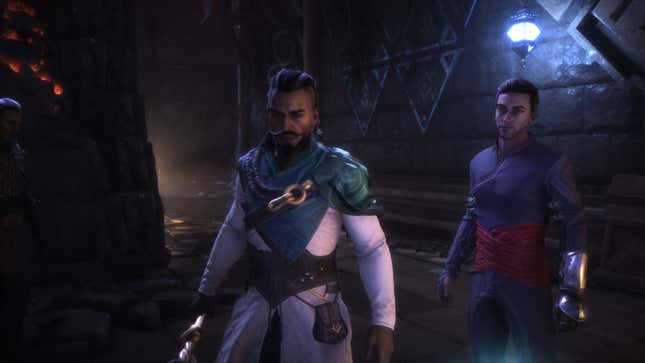
Throughout Dragon Age, the land of the Tevinter Imperium has been almost exclusively framed as a culturally homogenous, villainous place where mages rule without opposition, slavery is commonplace, and unspeakable evils made it the origin point of the Blight, one of the most ruinous phenomena in the universe. Our frame of reference for this perception, however, is largely from characters who were suffering at the ground level, at least until Dorian Pavus struts into view in Inquisition. By all accounts, Dorian should be thrilled with his setup in Tevinter. He’s the son of a powerful family, has been given every resource to nurture his magical talents, and is pretty much guaranteed a spot at the top of the country’s politics. But he is also his own man, and does not wish to cave to the life his family envisions for him. That includes standing proud as a gay man unwilling to continue his family’s bloodline, even as he is threatened with a magical take on conversion therapy at the hands of his own father.
Dorian escapes his home in Tevinter and is clearly jaded when he meets the Inquisitor. But as he watches the world change before him, how should he view his home country that, despite everything, he still loves? The heroes of the Dragon Age series have often fallen into cynical cycles of scorching the earth, as if they can’t conceive of a better option. Dorian Pavus, who’s been put through hell in Tevinter, could have easily been a cautionary tale reinforcing that his home country is just as terrible as everyone in the series has ever told us it is. But instead, he’s a shining beacon proclaiming that it doesn’t have to be this way. He is radical hope personified, living, breathing proof that history is defined by those who believe that a better world is possible.
In The Veilguard, Dorian is putting that belief into practice. He is a member of the Shadow Dragons revolutionary group, but he has his sights set higher. Depending on your choices, Dorian can ascend to the Archon throne in Minrathous. Having someone who cares about the people of Tevinter at the top feels like the natural conclusion to his story, and one of the more hopeful conclusions The Veilguard can leave off on. The elven gods have decimated Thedas, even after Rook defeats them, so it’s good to see someone who wants to build something better on top of the rubble finally have the power to do it.


